On the 32nd anniversary of the killing of four girls found nude, gagged and shot dead execution-style in the ashes of a yogurt shop, their families and the haunted Austin, Texas, community still haven’t seen justice served.
Firefighters responding to a fire at the I Can’t Believe It’s Yogurt! shop around midnight Dec. 6, 1991, were shocked to find the bodies of employees Eliza Thomas, 17, Jennifer Harbinson, 17, Sarah Harbinson, 15, and Amy Ayers, 13 still inside, according to reporting from KXAN.
But the girls weren’t just caught in the blaze. They had been tied up, stacked on top of each other and each shot in the head. At least one of the teens had been raped.
“You can’t help but relive those images, and I still see the images,” former Austin firefighter Rene Garza told the outlet.
FAMILY OF MISSING WYOMING WOMAN REVEALS ‘DISTURBING’ MESSAGES, RED FLAGS BEFORE SHE VANISHED
A billboard advertising a $125,000 reward for leads in the Yogurt Shop Murders in Austin, Texas, Dec. 7, 1993. (Kevin Virobik-Adams/Austin American-Statesman via AP)
A couple told police one of the girls locked up the store behind them an hour earlier, according to the Austin American-Statesman. Eliza and Jennifer worked at the store, and Jennifer’s sister Sarah was visiting with her friend Amy.
But investigators found no signs of forced entry at the shop and noted an open back door that the suspect or suspects must have used to flee. Two guns — a .22 revolver and a .380 semi-automatic pistol — were believed to be used in the killings, according to the Statesman.
Investigators theorized the teen girls were forced into the shop’s storage room, forced to undress, bound by their own undergarments and sexually assaulted. After they were killed with gunshots to the back of their heads, the criminals started the blaze to cover up their crime, using paper products from the yogurt shop doused in lighter fluid.
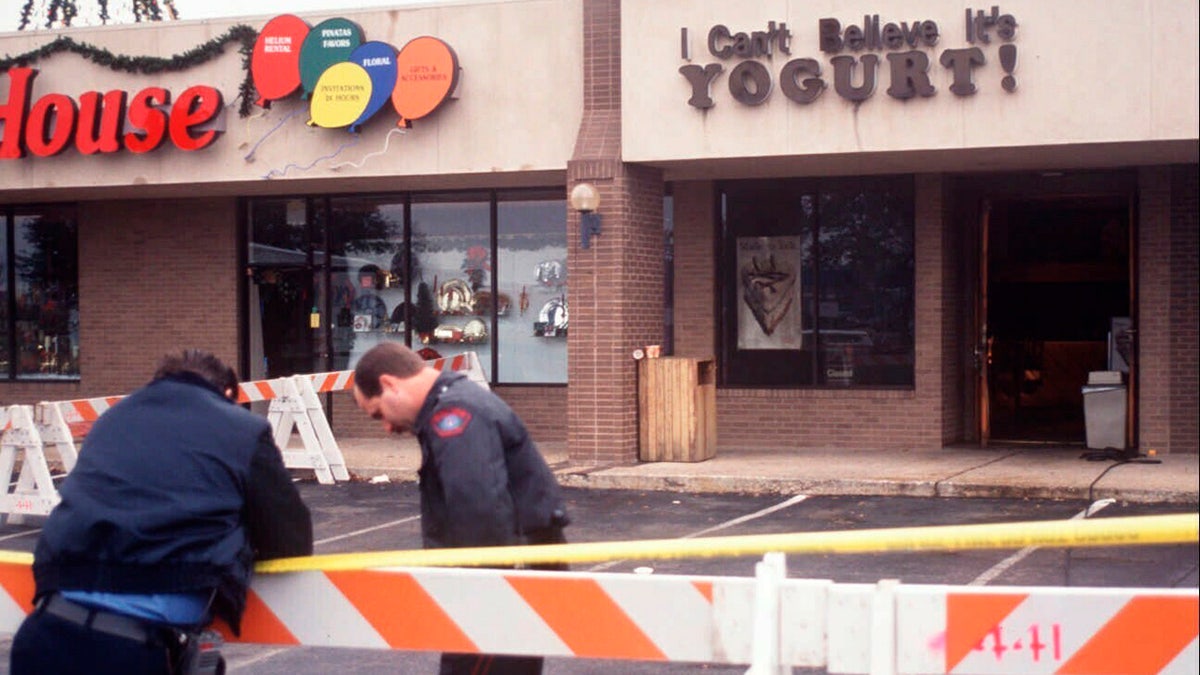
Officers at the scene of the Yogurt Shop Murders in Austin, Texas, Dec. 7, 1991. (Austin American-Statesman via AP)
Reward amounts for any evidence climbed from $25,000 to $100,000 to $125,000 as months, then years passed. Three decades later, investigators are still without conclusive answers to what happened that night.
Under pressure, dozens have falsely confessed to the girls’ murders.
In August 1992, Austin Police began searching for three men who were indicted in an unrelated abduction and sexual assault, saying they wanted to question them for the Austin quadruple homicide.
Mexican authorities said two of the men would be prosecuted after one confessed to the girls’ killings. But the suspect later recanted his statement, accusing Mexican police of torture, per the Statesman.
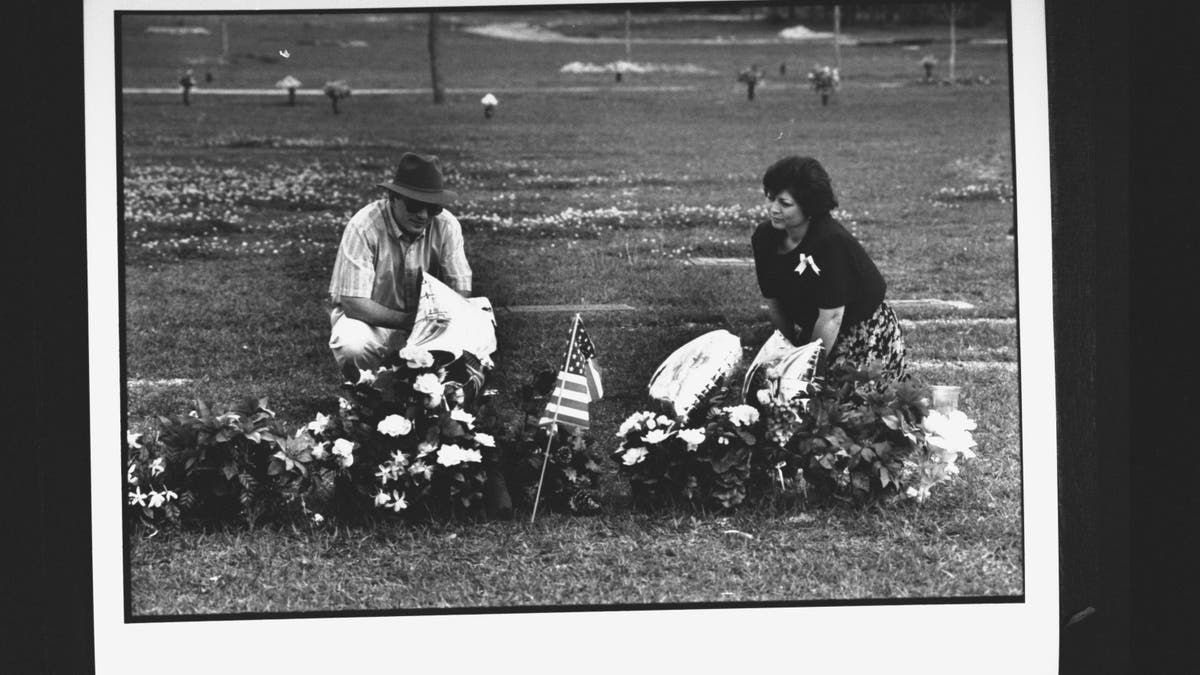
Barbara and Skip Sucari, the mother and stepfather of murder victims Jennifer and Sarah Harbison, visit the flower-covered graves of their daughters, who were shot to death at the end of their shift working at a yogurt shop. (Mark Perlstein/Getty Images)
By the next year, the outlet wrote, Austin Police had investigated more than 5,000 leads and still had no arrests.
Ultimately, police zeroed in on four teenage boys — Maurice Pierce, Michael Scott, Robert Springsteen and Forest Wellburn. Pierce had been found at a nearby mall with a gun on him that matched the caliber of one used at the yogurt shop, turning police attention toward the group.
The boys were detained and questioned multiple times over the years, according to People. By 1999, three of the four had confessed to the yogurt shop murders. But there was no physical evidence or witnesses that tied them to the scene.
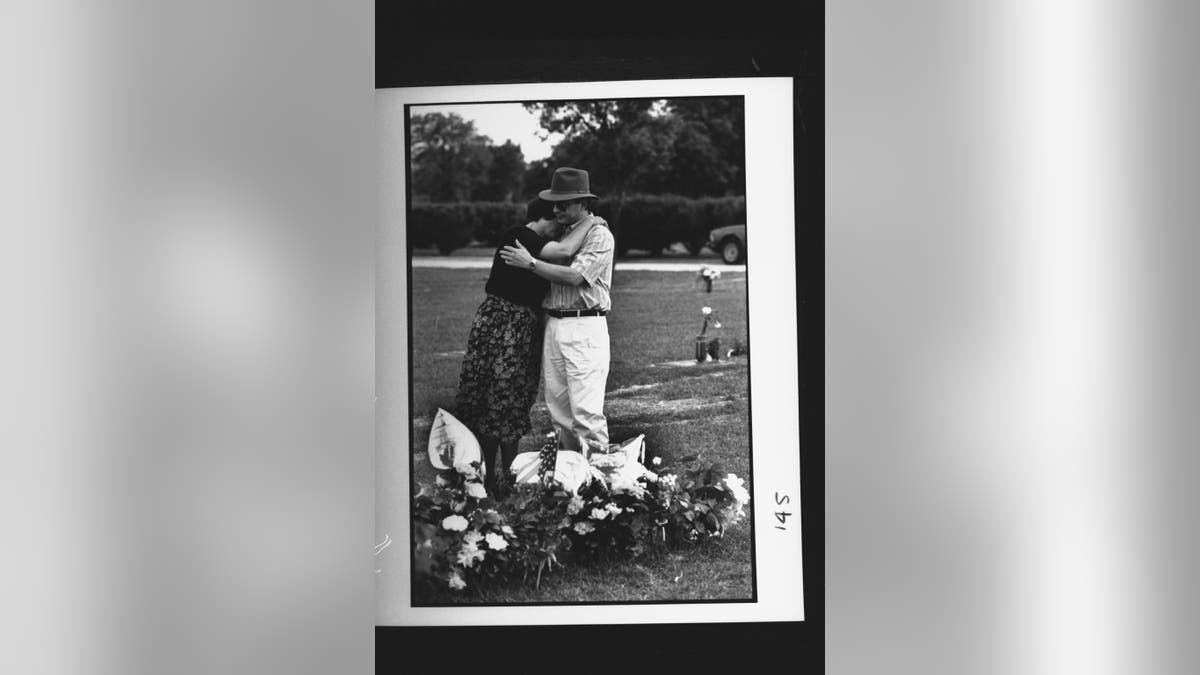
Barbara and Skip Suraci, the mother and stepfather of murder victims Jennifer and Sarah Harbison, embrace as they stand at the flower-covered graves of their daughters, who were shot to death at the end of their work shift at a yogurt shop. (Mark Perlstein/Getty Images)
Scott was placed on death row in 2001, and Springsteen was sentenced to life in prison the next year.
At a subsequent press conference, Austin Mayor Kirk Watson addressed his city, flanked by Chief of Police Stan Knee and DA Ronnie Earle.
“On December 6, 1991, we — as a city — lost our innocence. Today, we regain our confidence,” he said triumphantly.
BRIAN LAUNDRIE HIRED WYOMING LAWYER WHO DEFENDED BIN LADEN BODYGUARD IN GUANTANAMO
But a detective on the case later admitted withholding information that ruled out Pierce’s gun as the murder weapon. Another detective was captured on security footage holding a gun to Scott’s head during the multi-day interrogation that led to his confession that named the other men, as reported by Texas Monthly.
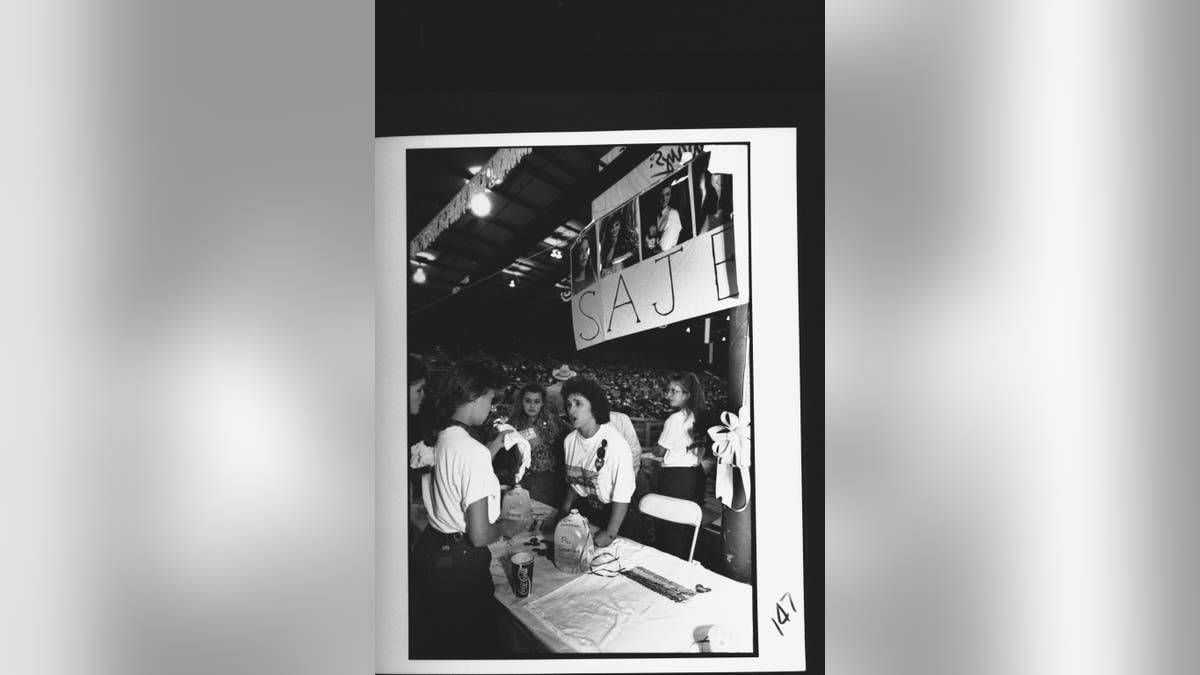
Pam Ayers, the mother of murder victim Amy, 13, raised memorial scholarship money at a stock show while standing at a table below photos of her daughter with three other teenage girls who were murdered at a yogurt shop. (Mark Perlstein/Getty Images)
Both men’s convictions were overturned by the Texas Court of Appeals in 2006, according to the Death Penalty Information Center, and a later 2009 analysis of DNA found at the crime scene did not match either of the men.
Although most potential evidence was destroyed in the fire, police did find a partial DNA profile, Austin Police Det. John Jones said in a “48 Hours” special.
But that profile only had 16 markers, meaning it could belong to thousands of men. It is enough to eliminate a potential suspect but not to identify one.
DELPHI MURDERS: INDIANA AG CALLS FOR ‘CARE AND PRUDENCE’ IN COMPLICATED CRIMINAL CASE
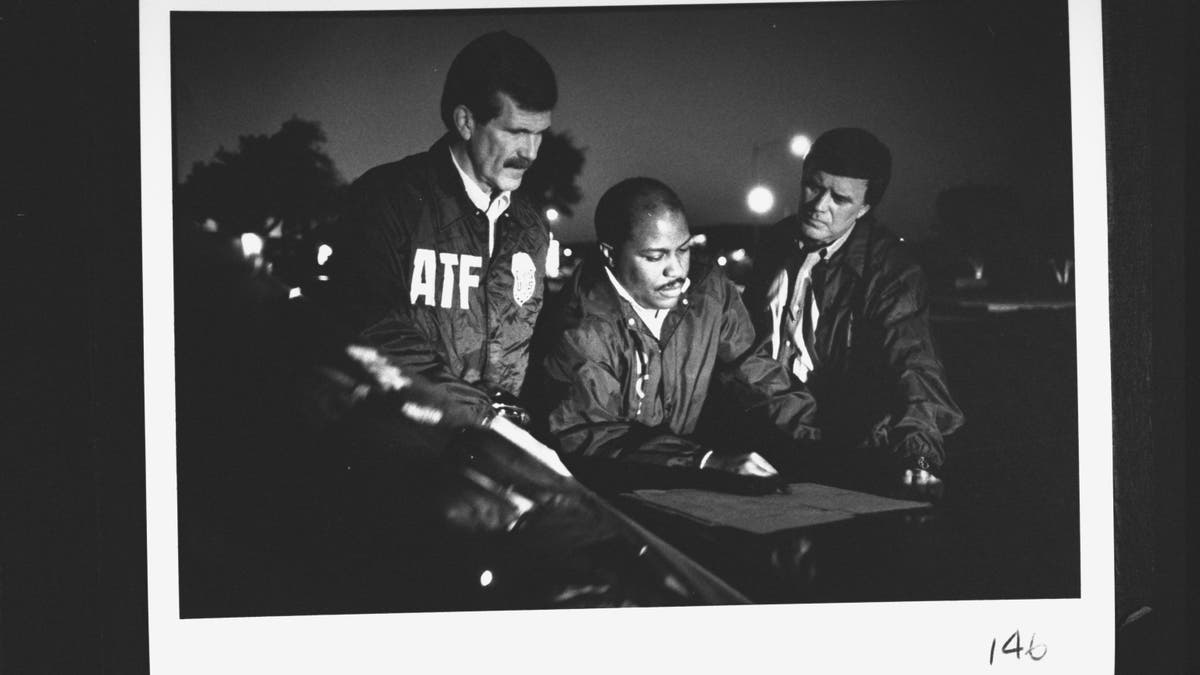
Fire agent Chuck Meyer with homicide sergeants John Jones and Mike Huckaby checking out charts on the hood of a car as they spearhead the investigation. (Mark Perlstein/Getty Images)
In 2017, Austin detectives submitted the sample into a database that matched an unidentified individual whose corresponding sample was provided by the FBI, according to CBS News. But federal agents never revealed the suspect’s identity, and an arrest was never made.
Last year, Congressman Michael McCaul cited the Yogurt Shop Murders when introducing the Homicide Victims’ Families Rights Act, a bill that allows for federal review and renewed investigation of cases that have gone cold at least three years.
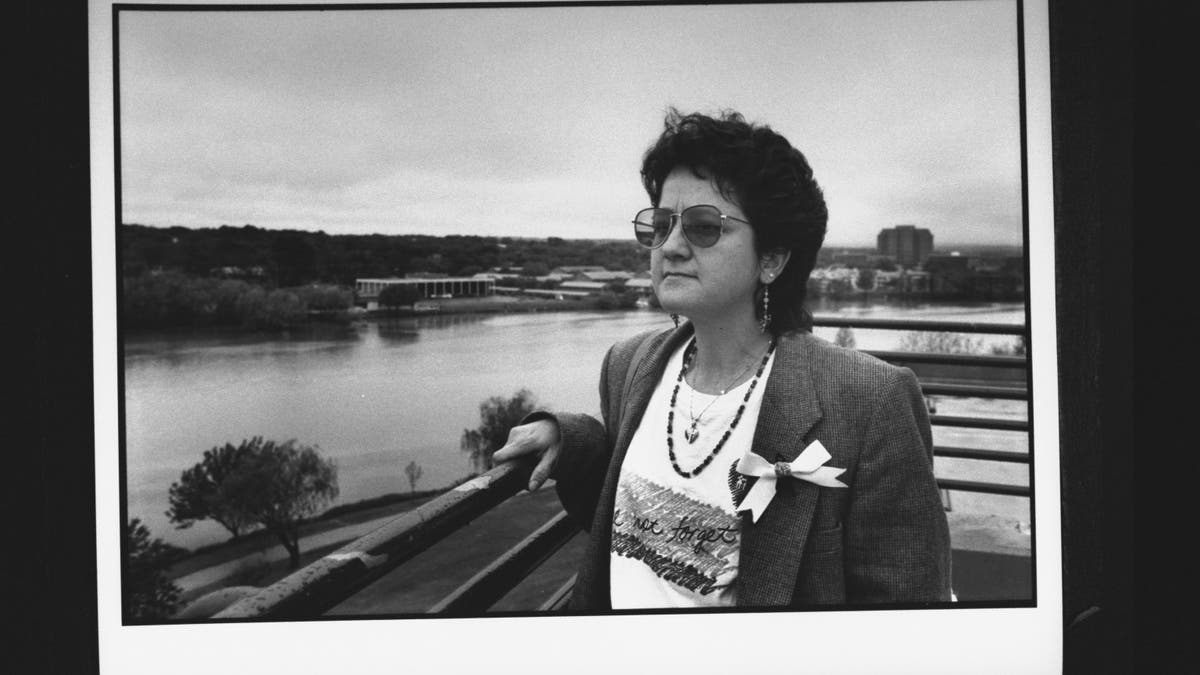
Mary Thomas, mother of murder victim Eliza Thomas, 17, stands on a deck at home, reflecting on how her daughter was shot to death with three other teenage girls at the yogurt shop where they worked together. (Mark Perlstein/Getty Images)
“After 30 years, we still do not know who is responsible for murdering four teenage girls at a yogurt shop in Austin, Texas,” McCaul said in a press release from his office. “By passing this legislation, we are providing not only hope, but resources to those who lost family members to federal murder cases in order to ensure cold cases do not stay that way.”
CLICK HERE FOR MORE TRUE CRIME FROM FOX NEWS
Amy’s family has worked to keep the investigation alive, with her older brother Shawn Ayers and his wife Angie starting the Texas Attorney General’s Cold Case and Missing Persons Advisory Committee.
“They’re not forgotten,” Angie told People. “They’re not given up on.”